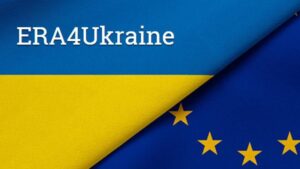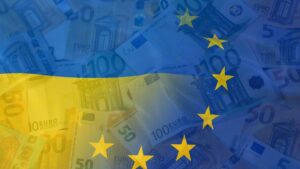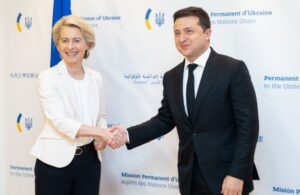
The Ministry of Infrastructure of Ukraine has sent an official appeal to the European Commission with proposals to increase economic pressure on the Russian Federation and the Republic of Belarus.
“Despite the already introduced restrictive measures, Russian business finds workarounds and continues to conduct operations in other countries. Accordingly, the existing sanctions do not fully achieve their goal,” the ministry said on its website on Tuesday.
In this regard, the Infrastructure Ministry proposes to the European Union: completely block land and sea transport links with Russia and Belarus; block the possibility of transporting goods and people to Russia and Belarus through the territory of the European Union and across its borders; prohibit the provision of customs services for goods delivered to Russia and Belarus.
“In particular, these measures are necessary to stop the supply of dual-use goods to the aggressor country that can be used for military needs,” the ministry said.
BELARUS, BLOCK, EUROPEAN COMMISSION, RUSSIA, TRANSPORT LINKS, UKRAINE

The European Commission has launched the ERA4Ukraine portal to provide information and support services to Ukrainian scientists forced to travel abroad due to the war, according to the Ministry of Education and Science of Ukraine.
According to the press service of the ministry, on the portal you can find information about the recognition of diplomas, current vacancies, receiving social assistance and housing offers for scientists and their families.
“The ERA4Ukraine portal will operate within the EURAXESS network, which supports scientists from more than 600 research centers and contains 43 national portals in EU member states and countries that have become associate participants in the Horizon Europe research and innovation program. The portal contains information about support of Ukrainian scientists from 30 countries in English. The Ukrainian version will be available soon,” the report says.
ERA4UKRAINE, EUROPEAN COMMISSION, HELP, UKRAINIAN SCIENTISTS, ПОРТАЛ

The Council of the European Union approved on Friday the decision of the European Commission to provide additional macro-financial assistance worth EUR 1.2 billion to Ukraine.
“The current geopolitical tensions are having a severe economic impact on Ukraine. Member states are ready to provide EUR 1.2 billion macro-financial assistance. We decided to support the Commission’s proposal today, so that the financial help can reach Ukraine without delay,” President of the EU Council, French Minister for Economic Affairs, Finance and Recovery Bruno Le Maire said.
The decision will come into force after approval by the European Parliament, which should happen in the near future. The emergency macro-financial assistance is set to have a duration of 12 months and it would consist of two disbursements. The disbursement of the second tranche would be linked to the continuous satisfactory implementation of both an IMF programme and the policy measures agreed in the Memorandum of Understanding.
“Persistent security threats have triggered a substantial outflow of capital. Against the backdrop of the loss of access to international capital markets due to the heightened geopolitical uncertainty and its impact on the economic situation in Ukraine,” the EU Council press service said, justifying the urgency of providing additional assistance.
The EU-Ukraine Association Agreement, which entered into force on September 1, 2017, brings the Ukraine and the EU closer together. In addition to promoting deeper political ties, stronger economic links and the respect for common values, the agreement has provided a framework for pursuing an ambitious reform agenda, focused on the fight against corruption, an independent judicial system, the rule of law, and a better business climate.
Among other support instruments, between 2014 and 2021 the EU supported Ukraine through five consecutive Macro-Financial Assistance (MFA) operations that totalled EUR 5 billion of loans.
On February 1, 2022, the Commission submitted a proposal for an additional 1.2 billion macro-financial assistance to Ukraine in the form of loans to strengthen stability.
The same amount of assistance, but from France, was announced by President Emmanuel Macron during a recent visit to Kyiv. He called it “state guarantees for financing Ukrainian projects of French companies” within the agreement reached back in May.

Executive Vice-President of the European Commission Valdis Dombrovskis says the decision to provide Ukraine with another financial assistance in the amount of EUR 1.2 billion will be signed on February 1. “We are stepping up our support for Ukraine both in the immediate and medium term. The European Commission is going to adopt a new emergency macro-financial assistance package of EUR 1.2 billion tomorrow,” he said at a joint briefing with Prime Minister Denis Shmyhal in Kyiv on Monday.
He said that in order for the European Commission to provide the first tranche of EUR 600 million in the near future, this decision must be passed through the European Parliament, after which a memorandum of understanding must be signed on the directions of financing these funds.
Dombrovskis said this support is related to the programs that Ukraine has with the IMF.

President of Ukraine Volodymyr Zelensky discussed with President of the European Commission Ursula von der Leyen issues of energy security and the development of the security situation around Ukraine, according to the presidential website.
“The head of state informed the interlocutor about the development of the security situation along the borders of Ukraine and in Donbas. The president thanked the head of the European Commission for the consistent support of the sovereignty and territorial integrity of our state, as well as her clear position on the need to tighten EU sanctions in the event of an escalation of Russian aggression against Ukraine. The leaders agreed with the need to continue joint coordinated efforts to prevent the escalation of the conflict,” the President’s Office said on its website.
Zelensky and von der Leyen reportedly discussed challenges for European energy security.
The sides also discussed preparations for holding an international energy business forum in Ukraine, which was agreed upon in November.
The head of state drew attention to the threats to Ukraine and all of Europe that the possible launch of Nord Stream 2 would create. The interlocutors coordinated steps aimed at integrating the unified energy system of Ukraine into the European ENTSO-E network.
Zelensky thanked von der Leyen for the financial support to Ukraine from the European Union and discussed areas for further cooperation.
In addition, the sides paid special attention to the prospects for the liberalization of road freight transport. Zelensky said the conclusion of an agreement on the liberalization of transportation services will help ensure further growth in trade between Ukraine and the EU.

The European Commission (EC) welcomes Ukrainian President Volodymyr Zelensky’s determination to fight the deeply rooted influence of vested oligarchic interests on the country’s life and expects the next steps in this direction.
The European Commission said this to the Interfax-Ukraine agency on Friday commenting the adoption of the law on de-oligarchisation by the Verkhovna Rada.
“We welcome President Zelensky’s determination to address the deeply rooted influence of vested oligarchic interests in the political and economic life of Ukraine,” the European Commission said.
The diplomats in Brussels underscored the adoption of the bill “On the prevention of threats to national security associated with the excessive influence of persons with significant economic or political heft in public life (oligarchs)” at the second reading in the Verkhovna Rada on 23 September. “This is a step forward. We expect the law to be implemented fully and with determination, in a legally sound manner. We believe that in addition to the implementation of the adopted law, more steps are needed, in particular to close Ukraine’s institutional gaps, to achieve the desired de-oligarchizing effect,” they noted.
At the same time the European Commission stressed that Ukraine “invested a lot of efforts into closing the space for corrupt practicing, by i.a. cleaning the banking sector and ensuring transparency of the public procurement.” “We encourage to continue these efforts in others sectors prone to corrupt practices,” the diplomats said.
They are convinced that “strengthening of planned and existing institutions (such as the rule of law authorities, including the court system; the Anti-Monopoly Committee; the public broadcaster; an independent press regulator among others) should stand at the heart of this fight to consolidate the rule of law, shore up the trust of Ukrainian citizens in public institutions and, not least, to unleash Ukraine’s economic potential for the benefit of all people of Ukraine.”